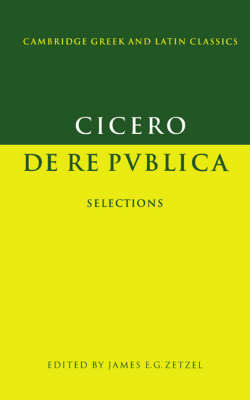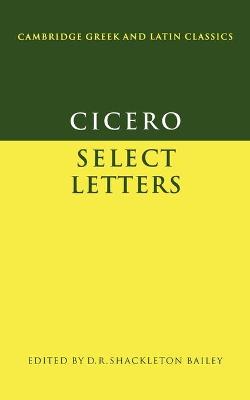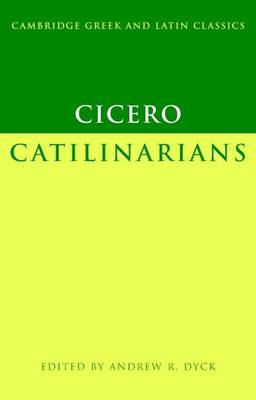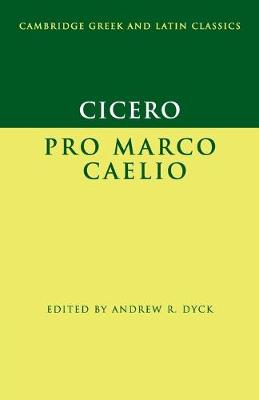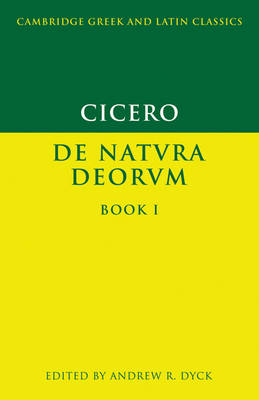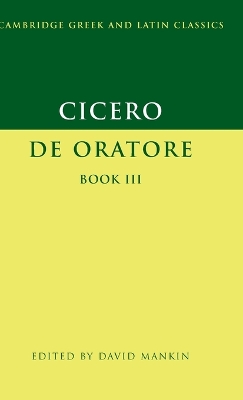Cambridge Greek and Latin Classics
7 total works
Cicero's De re publica contains the fullest ancient account of the theory of the mixed constitution and the oldest extant narrative of early Roman history; it concludes with the Dream of Scipio, one of the most influential ancient visions of the afterlife. The argument of the dialogue concerns the relationship between political theory and practice, and between social institutions and the individual citizen. This edition of most of the surviving portions of De re publica is the most detailed commentary ever to appear in English. It explains Cicero's philosophical argument and its relationship to his account of early Rome, and thoroughly elucidates the language and style of the treatise. The introduction offers a new and provocative interpretation of Cicero's dialogue as a work both of literature and of political philosophy.
Professor Shackleton Bailey is renowned for his major scholarly editions of Cicero's letters already published by Cambridge University Press. This selection from the complete correspondence is designed specifically for students at universities and in the upper forms at schools, and offers them a representative introduction to one of the most varied and most important literary correspondences in any language. In choosing letters for inclusion the editor concentrates on Cicero as a man and writer and on his relationship with his contemporaries, but he has also included letters which deal with people and events of special significance in the turbulent political history of the period. The edition includes an introduction, the text of the letters with critical notes, and a commentary which gives help with linguistic problems as well as elucidating the historical and social background.
As consul in 63 BC Cicero faced a conspiracy to overthrow the Roman state launched by the frustrated consular candidate Lucius Sergius Catilina. Cicero's handling of this crisis would shape foreverafter the way he defined himself and his statesmanship. The four speeches he delivered during the crisis show him at the height of his oratorical powers and political influence. Divided between deliberative speeches given in the senate (1 and 4) and informational speeches delivered before the general public (2 and 3), the Catilinarians illustrate Cicero's adroit handling of several distinct types of rhetoric. Beginning in antiquity, this corpus served as a basic text for generations of students but fell into neglect during the past half-century. This edition, which is aimed primarily at advanced undergraduates and graduate students, takes account of recently discovered papyrus evidence, recent studies of Cicero's language, style and rhetorical techniques, and the relevant historical background.
Pro Marco Caelio is perhaps Cicero's best-loved speech and has long been regarded as one of the best surviving examples of Roman oratory. Speaking in defence of the young aristocrat Marcus Caelius Rufus on charges of political violence, Cicero scores his points with wit but also with searing invective directed at a supporter of the prosecution, Clodia Metelli, whom he represents as seeking vengeance as a lover spurned by his client. This new edition and detailed commentary offers advanced undergraduates and graduate students, as well as scholars, a detailed analysis of Cicero's rhetorical strategies and stylistic refinements and presents a systematic account of the background and significance of the speech, including in-depth explanations of Roman court proceedings.
Book 1 of De Natura Deorum exhibits in a nutshell Cicero's philosophical method, with the prior part stating the case for Epicurean theology, the latter (rather longer) part refuting it. Thus the reader observes Cicero at work in both constructive and skeptical modes as well as his art of characterizing speakers. Prefaced to the Book is Cicero's most elaborate justification of his philosophical writing. The Book thus makes an ideal starting point for the study of Cicero's philosophica or indeed of any philosophical writing in Latin, since it delineates the problems such a project raised in the minds of Roman readers and shows how Cicero thought they could be met. There is also a systematic and detailed doxography of ancient views about the deity, an important document in itself, presented from an Epicurean perspective. The volume's Introduction situates this text within Cicero's intellectual development and ancient reflection about the gods.
Cicero's De Oratore is one of the masterpieces of Latin prose. A literary dialogue in the Greek tradition, it was written in 55 BCE in the midst of political turmoil at Rome, but reports a discussion 'concerning the (ideal) orator' that supposedly took place in 90 BCE, just before an earlier crisis. Cicero features eminent orators and statesmen of the past as participants in this discussion, presenting competing views on many topics. This edition of Book III is the first since 1893 to provide a Latin text and full introduction and commentary in English. It is intended to help advanced students and others interested in Roman literature to comprehend the grammar and appreciate the stylistic nuances of Cicero's Latin, to trace the historical, literary, and theoretical background of the topics addressed, and to interpret Book III in relation to the rest of De Oratore and to Cicero's other works.
